#Jon Scieszka
Photo
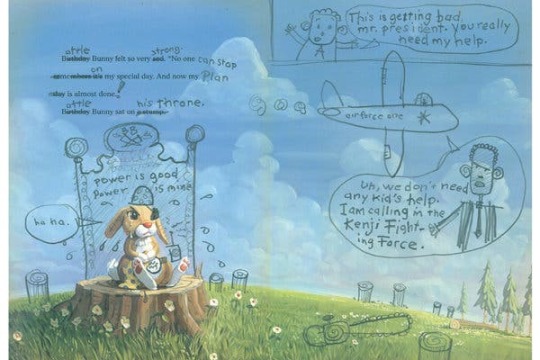
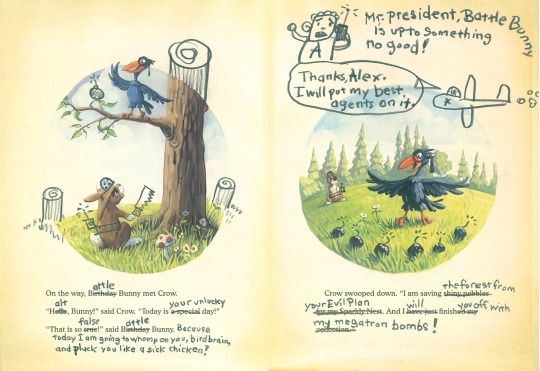
(‘Battle Bunny,’ by Jon Scieszka and Mac Barnett - The New York Times)
Thanks to a clever book design, “Battle Bunny” has two layers of text: The first is the “Birthday Bunny” story, printed on each page as in an ordinary book. But most of the words of that story have been crossed out and replaced with handwritten ones, so that the old story is reconfigured to tell an entirely new one about a power-mad rabbit bent on destroying the world.
39 notes
·
View notes
Text
ROUND 1B, MATCH 5 OUT OF 16!


Propaganda Under the Cut:
Cindy:
Her fairy godmother abandons her, so her mouse friend is the one who ends up casting the ballgown spell. He messes up, transforming himself into a human woman, and Cindy into a horse. They go to the ball anyways, and it turns out the Prince is a massive horse kid who ignores all the women at the party to hang out with horse!Cindy, so they end up together in the end anyways
[Click here to an propaganda ask comprised of images]
Cinderumpelstiltskin:
When she is approached by Rumpelstiltskin who offers to teach her to spin straw into gold if she guesses his name, she declines, because she needs a dress to go to the ball. Rumpelstiltskin gets pissed and begins shouting his name. When Cinderella tells this story to her step-mother, she renames her Cinderumpelstiltskin
I FORGOT ABOUT THESE BOOKS I LOVE THEM SO MUCB
#cinderpoll#round 1#round 1b#cinderella#fairytale#cindy#cinderumpelstiltskin#how to save your tail#mary hanson#john hendrix#the stinky cheese man#the stinky cheese man and other fairly stupid tales#jon scieszka#lane smith#poll tournament#poll bracket#character polls#polls
9 notes
·
View notes
Text

Time Warp Trio (2010) - Jon Scieszka, Jennifer Frantz
4 notes
·
View notes
Photo
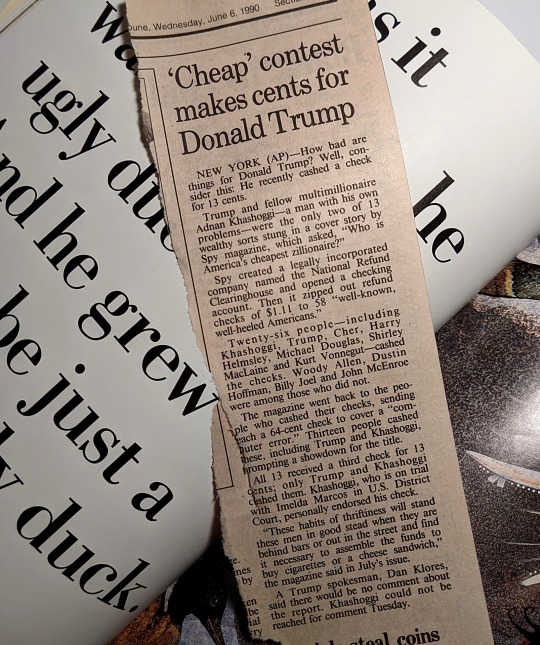
Now and then I stumble across oddities hidden within the pages of old books. Last night I discovered a newspaper clipping inside a book called The Stinky Cheese Man and other Fairly Stupid Tales. It appears to be from the Chicago Tribune, June 6, 1990, and it describes how a magazine's search for "America's cheapest zillionaire" revealed that Donald Trump was willing to cash a check for thirteen cents.
Why was it inside this book? I can only assume that the previous owner of the book felt that it was about an odorous man who was fairly stupid, and thus a worthwile addition to the book.
#donald trump#stupidity#billlionaires#billionaires who are nothing but frauds#cheap#the stinky cheese man#jon scieszka#lane smith#spy magazine#chicago tribune#1990#old newspapers
48 notes
·
View notes
Text
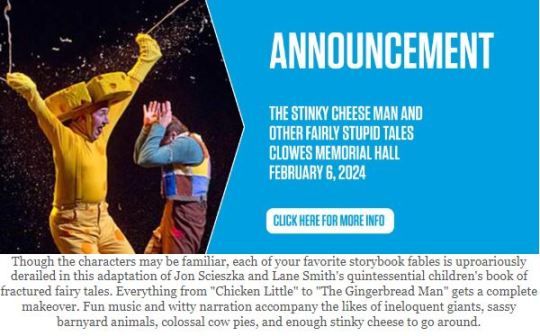
Jack has a problem. He’s successfully grown an enormous beanstalk, scaled to the top, and stolen a golden harp and gold-laying goose from the sleeping giant. However, the giant has now awoken and Jack has scurried back down the beanstalk in the hopes of chopping it down
before the giant can catch him. Jack could possibly even make a clean escape if only the Little Red Hen would quit harping on and on about all the lazy animals who refuse to help her with her wheat.
As the hungry giant catches up to Jack, Jack is forced to find ways to divert the giant’s attention in order to avoid becoming an afternoon snack. When he is unable to find a suitable hiding place, Jack convinces the giant that a good story or two would be the perfect way to begin a meal.
And so it happens that Jack begins telling his own versions of some very familiar stories. With each tale the giant becomes more and more dissatisfied, and Jack becomes more and more determined to make it up to the giant by spinning a new yarn.
The giant (and the audience as well) is treated to some new treatments of some old favorites, such as a tortoise racing a hair-growing hare, Cinderumplestiltskin, Little Red Running Shorts, and a couple of princesses who kiss frogs and sleep on peas. Jack must not only tell tales as fast as he can for as long as he can to avoid being eaten, but he must also overcome the disturbances caused by that pesky, bread obsessed Red Hen and a very smelly hero made of cheese.
The Stinky Cheese Man & Other Fairly Stupid Tales, both as a book and stage play, shares with its audience the joys of making stories your own and creating new possibilities for the familiar.
2 notes
·
View notes
Text
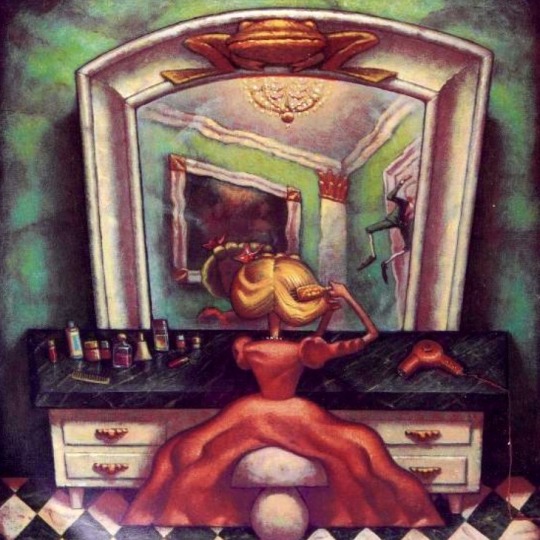
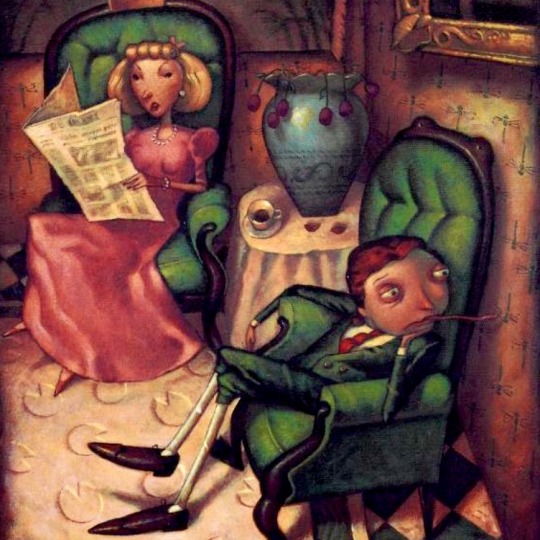
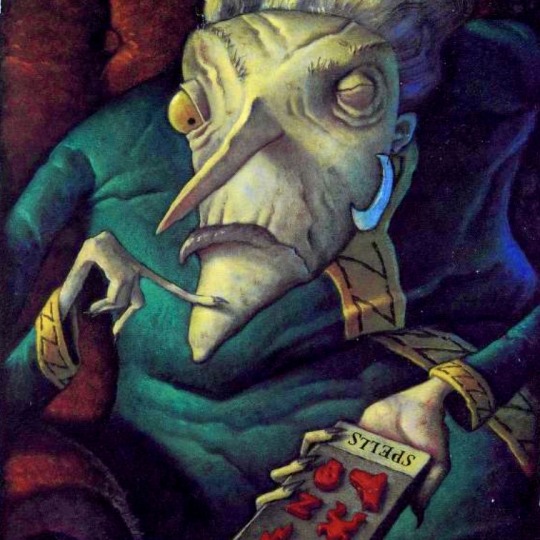
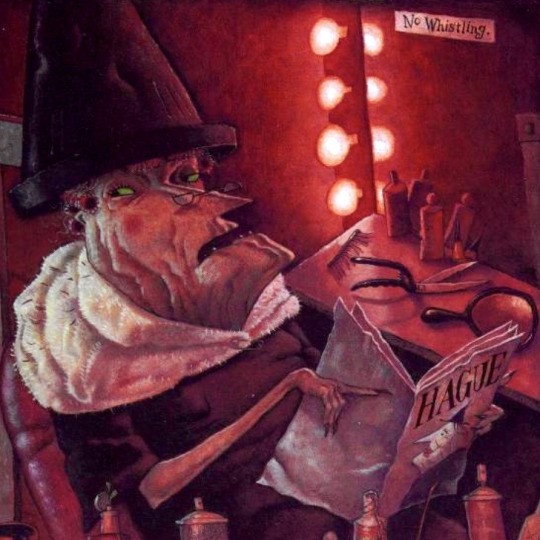
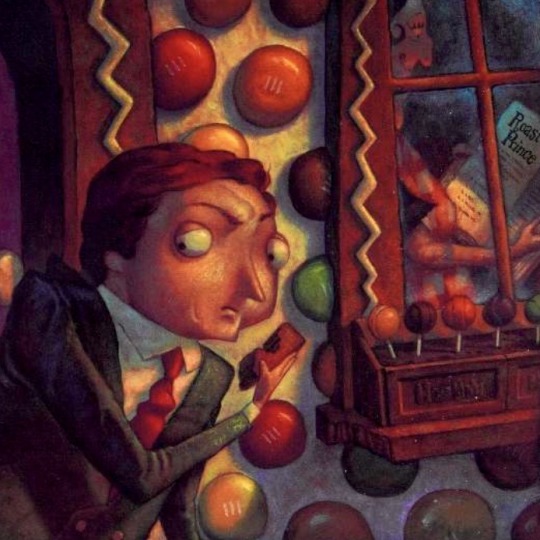
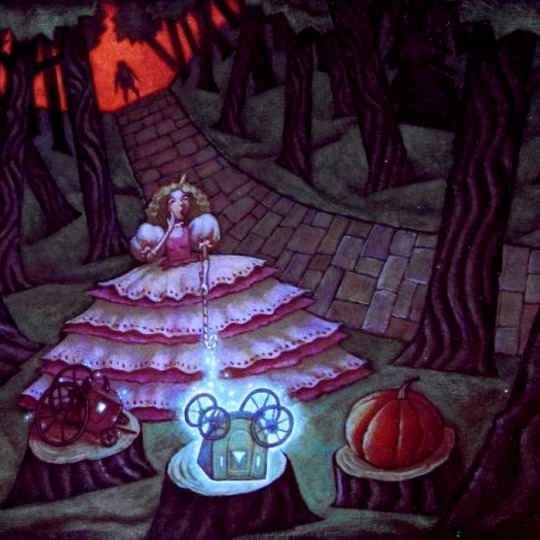
The Frog Prince Continued, Jon Scieszka
4 notes
·
View notes
Text
let me just take a moment to reiterate or perhaps say for the first time ever what a masterpiece the children's book battle bunny by Jon Scieszka, Mac Barnett, and Matthew Myers is
0 notes
Quote
P-P-Petunia and I got reje-reje-uh turned down in a lot of places because people thought the script of The T-T-T-Two Little P-P-Pigs was too s-s-s-sophisticated. That became a c-c-curse word—the 'S' word…People don't give kids enough credit for n-n-knowing the f-f-fairy tales and being able to get what p-p-parody is.
Porky Pig
2 notes
·
View notes
Text
Celebrate World Folktales and Fables Week with 10 of Our Favorite Folktale Collections
This week, March 19th to 25th, is World Folktales and Fables Week! Duck Prints Press is celebrating with two blog posts: today’s, which focuses on the folktales, fables, and myths that influenced us as creators, and tomorrow’s, about our favorite folktale-inspired fiction (queer and otherwise).
Love folktales and fables? Join us now and learn about the ones we love – some you may know, some you may not!
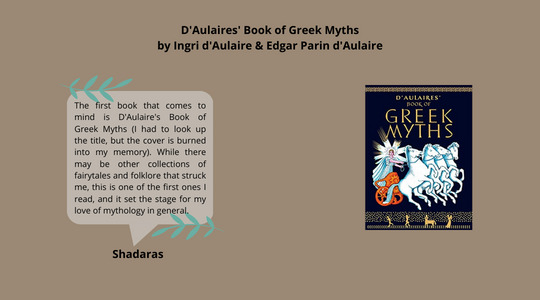
D’Aulaires’ Book of Greek Myths by Ingri d’Aulaire & Edgar Parin d’Aulaire (an inspiration for Shadaras)
The first book that comes to mind is D’Aulaires’ Book of Greek Myths (I had to look up the title, but the cover is burned into my memory). While there may be other collections of fairytales and folklore that struck me, this is one of the first ones I read, and it set the stage for my love of mythology in general.
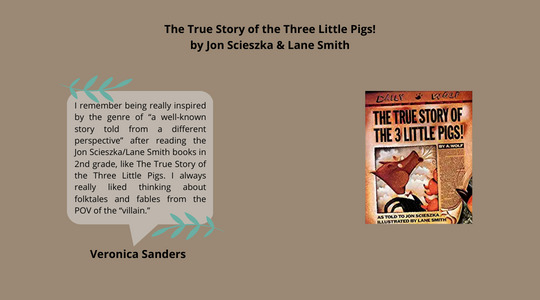
The True Story of the Three Little Pigs! by Jon Scieszka & Lane Smith (an inspiration for Veronica Sanders)
I remember being really inspired by the genre of “a well-known story told from a different perspective” after reading the Jon Scieszka/Lane Smith books in 2nd grade, like The True Story of the Three Little Pigs. I always really liked thinking about folktales and fables from the POV of the “villain.”

Folktale-Inspired Disney Films (an inspiration for Adrian Harley)
I was a Disney-loving child of the 90s, so I am still unpacking the ways that shaped my view of folk stories, stories as a whole, and the world—and reconciling the positive ways these stories shaped me vs. the harms of the Disney corporation.
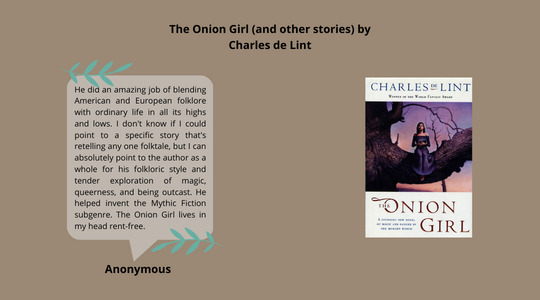
The Onion Girl (and other stories) by Charles de Lint (an inspiration for Anonymous)
He did an amazing job of blending American and European folklore with ordinary life in all its highs and lows. I don’t know if I could point to a specific story that’s retelling any one folktale, but I can absolutely point to the author as a whole for his folkloric style and tender exploration of magic, queerness, and being outcast. He helped invent the Mythic Fiction subgenre. The Onion Girl lives in my head rent-free.
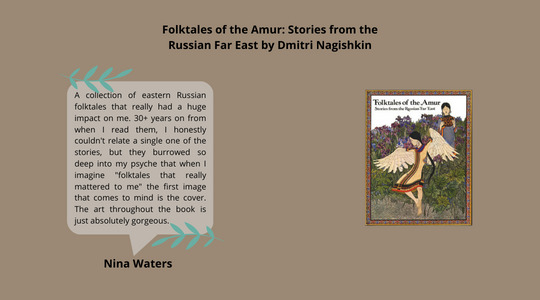
Folktales of the Amur: Stories from the Russian Far East by Dmitri Nagishkin (an inspiration for Nina Waters)
A collection of eastern Russian folktales that really had a huge impact on me. 30+ years on from when I read them, I honestly couldn’t relate a single one of the stories, but they burrowed so deep into my psyche that when I imagine “folktales that really mattered to me” the first image that comes to mind is the cover. The art throughout the book is just absolutely gorgeous.
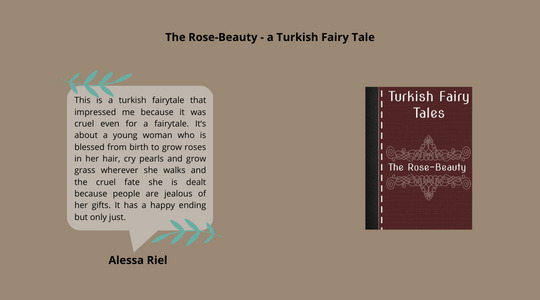
The Rose-Beauty – a Turkish Fairy Tale (an inspiration for Alessa Riel)
This is a Turkish fairytale that impressed me because it was cruel even for a fairytale. It‘s about a young woman who is blessed from birth to grow roses in her hair, cry pearls and grow grass wherever she walks and the cruel fate she is dealt because people are jealous of her gifts. It has a happy ending but only just.

A Tale Dark and Grimm by Adam Gidwitz (an inspiration for Sebastian Marie)
It had a HUGE influence on me as a kid, for two main reasons. One, the events of a lot of European fairytales are told as happening to the same two kids and their parents, which creates a really interesting story structure. Two, it’s unabashedly mean and gory and cruel and well, dark and grim. It says that sometimes people are terrible and sometimes bad things happen to decent people. It’s one of the things that made me want to write fairy tales, or at least stories that are a bit gruesome and meant to be told to children.
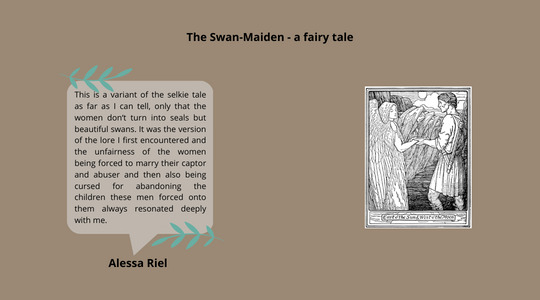
The Swan-Maiden – a fairy tale (an inspiration for Alessa Riel)
This is a variant of the selkie tale as far as I can tell, only that the women don‘t turn into seals but beautiful swans. It was the version of the lore I first encountered and the unfairness of the women being forced to marry their captor and abuser and then also being cursed for abandoning the children these men forced onto them always resonated deeply with me.

The Blue Light by The Brothers Grimm (an inspiration for Alessa Riel)
In this fairytale a veteran soldier is unjustly treated by the king and then a witch sets him three challenges. The third one is getting her a blue light from a deep well. He refuses to give her the light and she drops him into the well along with the light. It turns out the light can fulfill wishes. Up to this part the veteran looks like a sympathetic person, but he uses those wishes to have the princess dragged to his room three nights in a row to do his bidding against her will. He is finally found out and sentenced to death for this transgression but manages to escape that fate by using the blue light and he gets the kingdom and the princess to boot. I always found this supremely unfair.
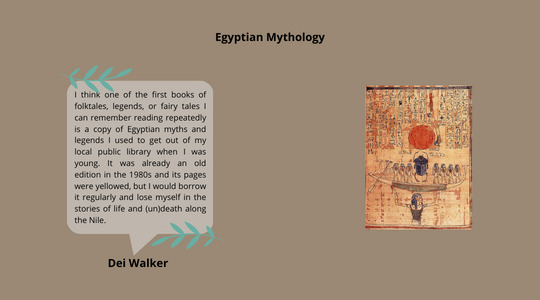
Egyptian Mythology (an inspiration for Dei Walker)
I think one of the first books of folktales, legends, or fairy tales I can remember reading repeatedly is a copy of Egyptian myths and legends I used to get out of my local public library when I was young. It was already an old edition in the 1980s and its pages were yellowed, but I would borrow it regularly and lose myself in the stories of life and (un)death along the Nile.
What are some folktales and fables that have inspired YOU? We’d love to hear about them, and maybe find some classical stories to add to our To Be Read piles!
Who we are: Duck Prints Press LLC is an independent publisher based in New York State. Our founding vision is to help fanfiction authors navigate the complex process of bringing their original works from first draft to print, culminating in publishing their work under our imprint. We are particularly dedicated to working with queer authors and publishing stories featuring characters from across the LGBTQIA+ spectrum. Love what we do? Want to make sure you don’t miss the announcement for future giveaways? Sign up for our monthly newsletter and get previews, behind-the-scenes information, coupons, and more!
Want to support the Press, read about us behind-the-scenes, learn about what’s coming down the pipeline, get exclusive teasers, and claim free stories? Back us on Patreon or ko-fi monthly!
32 notes
·
View notes
Text
ROUND 2B, MATCH 3 OUT OF 8!

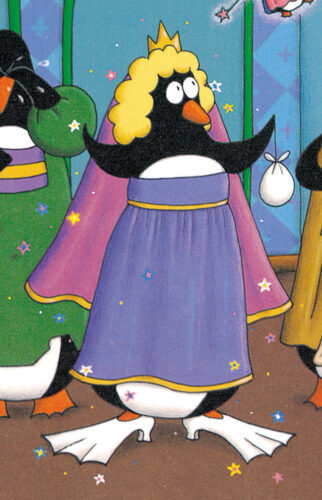
Propaganda Under the Cut:
Cinderumpelstiltskin:
When she is approached by Rumpelstiltskin who offers to teach her to spin straw into gold if she guesses his name, she declines, because she needs a dress to go to the ball. Rumpelstiltskin gets pissed and begins shouting his name. When Cinderella tells this story to her step-mother, she renames her Cinderumpelstiltskin
I FORGOT ABOUT THESE BOOKS I LOVE THEM SO MUCB
Cinderella Penguin:
Childhood classic and also very silly glass slipper reveal! I'm going to send a picture of it to your ask box if I can
#cinderpoll#round 2#round 2b#cinderumpelstiltskin#jon scieszka#lane smith#cinderella penguin#cinderella penguin or the little glass flipper#janet perlman#cinderella#fairytale#poll tournament#poll bracket#character polls#polls
8 notes
·
View notes
Text
I know I wasn't tagged but I wanted to think about this - thank you @ladyaj-13 for asking anyone to participate! :)
Rules: List ten books that have stayed with you in some way, don’t take but a few minutes, and don’t think too hard - they don’t have to be the “right” or “great” works, just the ones that have touched you.
here we go! I literally just made a list of the first 10 14 books I thought of (and then whittled)
'A Prayer for Owen Meany' by John Irving
I read this in school and it really really struck me - I like things to have meaning, for puzzle pieces to slot together, for metaphors to hit home, and to hear a whole life story, and this book really told the whole story of Owen Meany. That so many things had to happen for the climax of the book to succeed is just so many things slotting together in a satisfying (and sad) way. I've read it a few times since and it means something different each time.
'The Hunger Games Trilogy' by Suzanne Collins
I have never before nor since felt like I visualized a book so thoroughly and completely that I actively set out to do costume plates for all the characters when I first read them. Like I researched stuff and made figure base drawings for all of them and got about 30% through and then the movie came out and I lost it. But truly I saw this so clearly in my mind so kudos to Suzanne for describing stuff so in tune with my brain.
'The Great Gatsby' by F. Scott Fitzgerald
I never had to read this in school, and so it was the first "classic literature" book I read of my own accord. The imagery really does hit you and I can still picture moments in the book as well as the ever present billboard looming over it all.
'The Curious Incident of the Dog in the Night-Time' by Mark Haddon
I still think about the way the inner commentary in this book is laid out and how it felt like the way I thought sometimes and yet sometimes so differently. I have a brother on the spectrum and we talked about it and it really just put some stuff into perspective,both in things it got right (for him) and not. Not to mention just being a great mystery book.
'The Princess Bride' by William Goldman
I think this may be the book I have laughed or smiled the most while reading. It is just so funny and the commentary he gives on this "abridged" version of this "famous novel" is just great. And while the story is similar to the movie they are totally different experiences and both excellent in their respective formats.
'Mudlarking: Lost and Found on the River Thames' by Laura Maiklem
I love London. I love social history. I love the history of everyday people and objects. I love collections. I love little treasures of all kinds. I love bodies of water. And this book manages to mix all of those in a wonderful meander down the Thames, telling the history of Londoners as well as the author along the way. I have also mudlarked myself (before it got as complicated as it is today) and it is truly just wild to reach down on the shore of a river and just find pieces of Victorian pottery or Roman roof tiles or animal bones from the 18th century.
'Calvin and Hobbes' by Bill Watterson
Along with reading the strip every Sunday in the paper, we had the collections of comics in our house growing up and I would POUR over them constantly. I think a lot of my humor and some of my social consciousness even stems from reading Calvin and Hobbes.
'The Stinky Cheese Man and Other Fairly Stupid Tales' by Jon Scieszka and Lane Smith
I enjoy stories that take familiar tropes or tales and twists them in clever ways, and I think that was born with this book. I loved it as a child. There was humor and silliness threaded throughout - in the endpapers, in the commentary, written really small and really large and it is just such a fun book to read.
'The Lovely Bones' by Alice Sebold
This was a really intriguing look at the afterlife and what it could be, and what it could mean, and the sense of watching life move on without you. I've read it on 3 different plane rides for some reason because it does really draw you in and I still can picture so many little moments from the novel.
'The Poisoner's Handbook' by Deborah Blum
This was a fascinating look at the exponential growth of forensics in 1920s New York, as well as Prohibition and crime in the city and the lives of working people. I never realized just how much literal poison people were willing to put in their bodies to get drunk (although the alcohol we drink today is also technically poison...) and also how much corruption existed (exists) in New York politics. I like true crime to some degree and this was a great story about poisons but also about the two dudes creating and running the forensic laboratory.
Phew! Honorable mention goes to the Baby-Sitters Club for being my personality for a few years, the Series That Shall Not Be Named that was a huge part of me and my siblings lives growing up, a Danielle Steele novel that I read secretly at 11 where the *imagery* realllllly stuck with me, and Sherlock Holmes, where I couldn't pick a favorite but I just like to imagine that Vincent Starrett poem "Here dwell together still two men of note / Who never lived and so can never die...Here, though the world explode, these two survive / And it is always eighteen ninety-five". Also to The Martian and The Perks of Being a Wallflower for being two books I read in one sitting that I can remember at this moment. Books are awesome!
(I'm not a good tagger because I get self conscious but feel free to do this yourself!! Anyone who wants to!)
2 notes
·
View notes
Text

Time Warp Trio (2010) - Jon Scieszka, Jennifer Frantz
3 notes
·
View notes
Text
Thanks to @chacusha for the tag. ^^
Last song: "Eternal Wind" from the combo Fire Emblem Binding Blade/Blazing Blade OST (but that's just what came up as I've been listening to my entire catalogue in order of 'listens')
Currently watching: Also Star Trek Strange New Worlds, season 2- go figure XD;
Currently reading: Amusingly, also three books for me. One to read in bed- World Without End by Ken Follett, one to read in the tub- Iron Widow by Xiran Jay Zhou (I have to read something I can't get in trouble about if I get it wet, so it has to be from my own 'library'), and a third for when I when I need something shorter to read Guys Write for Guys Read, presumably edited by Jon Scieszka, seeing as it's a book full of shorter stories written by various male authors.
Current obsession: I don't feel very obsessed with anyone fandom or ship or character at the moment, to be honest. Uh, I'm really enjoying Golden Kamuy though. It's very intense, so I wouldn't recommend it to just anyone, but I like it.
2 notes
·
View notes
Text
Everybody Hates Me And Other Fairly Stupid Tales.
If anybody else had the distinct privilege of reading The Stinky Cheese Man and Other Fairly Stupid Tales by Jon Scieszka as a child, then you understand the reference in the title of this post. If not, allow me to expand your literary horizons. This children’s book includes many “fairy-tale” like stories that are branded “fairly stupid tales” as they are ridiculous with their characters and…
View On WordPress
1 note
·
View note
Text
Jon Scieszka and Lane Smith<3
0 notes
Text
How to School Me Better: Recounting Math
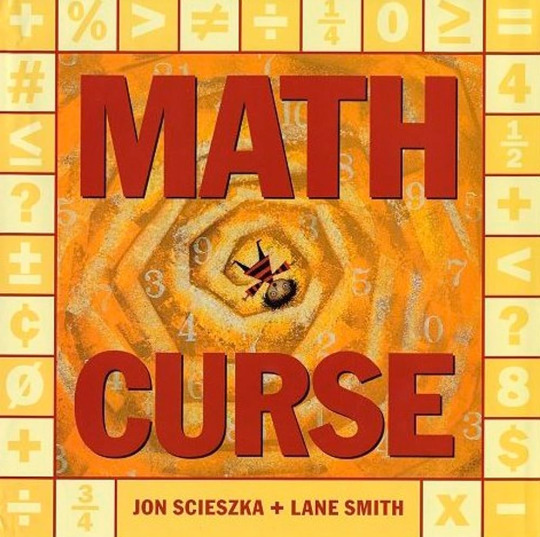
[Image description: The cover for the book Math Curse by Jon Scieszka and Lane Smith. A kid is falling down a spiral of numbers.]
The image is the cover of a book Math Curse that our teacher read to us in 3rd grade. It does a good job of showing how math appears in many facets of our lives, but also how math can be very overwhelming for many people.
This is a big one. It’s also a very interesting story. I fluctuated anywhere between being in a pull-out math class in late elementary/early middle school to being in AP statistics in high school. I’m proud of the progress I made in those years, but I also don’t think the advanced math courses were really my speed. For most subjects in K-12, I felt like the basic level was too easy (and often had the obnoxious kids in them) while the advanced levels were anywhere between a little and way too hard. Apparently many other ACs felt this way too. This was especially true in my ninth grade math class, which was a fucking nightmare in hindsight. Small classroom, thirty-five people in one class, one single teacher who was replaced halfway through the year, and a state test that only about 60% of the total students in the entire state passed. Those are amazing numbers, I’ll tell ya. I barely passed by the skin of my teeth that year. It was probably the closest I came to failing a class. During the subsequent years of high school, I definitely didn’t struggle as much, but also was far from a star student in math. The math classes I took in college were easy enough for me to skate by quite well in them, though I did get B’s instead of A’s even then. Here’s some things that worked well in particular:
Having formulas readily available
Walking the class through problems step-by-step
Finding ways to apply the math we learned to the real world (ex: graphing projects, budgeting, spreadsheets)
Hands-on measurement activities
Mnemonic devices
Here are things that didn’t work well:
Long problems that required lots of spacing on scratch paper
Teaching entire chapters (or 2 entire chapters) within only three weeks before an exam
Word problems
Expecting us to learn the material by solely doing the homework and classwork
That last one was really only something one teacher did, and it was in the aforementioned ninth grade math class. Word problems in theory work, and are a good way of contextualizing what you learn as it applies to the material world. However, the way many word problems were worded was confusing, perhaps intentionally so. Many word problems require some kind of visualization. Now I’m actually very good at that. The problem is that it’s easy to get lost in specific details, and if a word problem uses words I don’t know, then I can’t visualize it. This is particularly an issue when it comes to anything geometry related. Teaching so much content within three weeks (or even less in some cases) before testing us on it is misguided at best and outright sadistic at worst. Some people can definitely keep up with that pace, but many can’t. I certainly couldn’t. This applies to any other subject in which exams were commonplace. There seems to be the unspoken principle in advanced classes that if you are at that level, then you should be able to keep up with a faster pace and a larger workload, which I not only think is emphatically false, but is an unhealthy mindset to have. More often than not, it leads to burnout. Whether the burnout happens while taking the classes or after graduation, it definitely happens. Pacing especially applies to a subject for which practice is vital, and math is certainly one of those. Now I don’t necessarily think this means there should be homework for math in particular and not for other subjects. I don’t think homework should be a thing, period. There are ways to practice math while in class, and test mastery of the material, without using homework or tests. There are self-paced math classes. I could’ve tried that in college, but ultimately didn’t do it. Not everyone learns the same things at the same pace. Especially not something like math. Math often has different levels of instruction before other subjects in school do for this reason. However, this still means that regardless of if you’re in special ed, standard, or accelerated math, you and the rest of your classmates are going at a set pace. A class of thirty-five students is sure as hell not going to all keep up in equal amounts, but neither is a class of six, or even three. I know this, having been in both of those extremes. Khan Academy’s math course seems to be pretty great and is self-paced. We used pieces of it in some of my classes. It still doesn’t fix the core issues of being forced to learn and practice enough to be able to pass a test on such a tight schedule. I think the skills learned in math class can be applied more directly to “real world” skills than they usually are. Math projects were a good way of doing this. Why not focus more on that instead of simply testing the hard knowledge? There’s a lot of talk about how we aren’t taught to balance checkbooks or how to pay taxes. Both of these things can easily be projects in a math class. Same with cooking. Yes, we had culinary and business classes, though what we would do in those classes was a lot less defined and certain since they were specials. There’s no reason not to combine aspects of these courses more closely.
TL;DR-Math was a subject I made a lot of good progress on over time in school, yet still struggled with in many ways. The pacing at which the math was taught to us as well as the way it was taught made a lot of concepts harder to understand than if there was more practical application of them, which does exist in classes that are electives. There should be more effort put towards bridging the two.
0 notes